
by Lucy | Oct 23, 2018 | biblical counseling, book reviews, emotions
Contentment: Even for Christian women, contentment may seem an impossible day-by-day reality. It’s so easy to slip into discontent, right?
My own quest for contentment prompted my purchase of Megan Hill’s Contentment: Seeing God’s Goodness right when P&R released it. Her 31 days of devotional readings and life application has helped me keep my focus on Jesus as our ultimate hope.
Get a taste of her book below in an excerpt from her book, which appeared first here on The Biblical Counseling Coalition website. It is used with permission. (Edited for length.–LAM) HIGHLY RECOMMENDED

An Excerpt from Contentment
Discontent can strike at any time. On a Monday morning, the alarm goes off, and discontent is ready to pounce. Anything can invite an attack—a careless slosh from your coffee mug, a terse text from your spouse, a towering mountain of laundry on the basement floor—and you are frustrated with your life before you even walk out the door.
By the time the doctor’s office calls with your test results or the mail delivery brings a new round of bills, you are wishing for a new life entirely. Even something as simple as an unexpected rain shower can unleash thunderclouds in your heart. Just a few hours ago, you were joyfully worshipping God in the assembly of the saints at church and now you are thoroughly disappointed about how this same God is ordering events.
And it doesn’t stop there. Throughout our days, discontent waits for all of us. Whether we are young or old, alone or in a group, relaxing or working, we face circumstances that frustrate our expectations for what life should be like.
Worry
Once it takes hold of our hearts, discontent quickly leads to other sins. Because we fundamentally distrust what God is doing in and for us, our hearts give way to worry.
Every new circumstance feels surprising and potentially harmful. Everything from the flu to the presidential election brings an onslaught of uncertainty. We do not believe that God is caring for us, and we have little confidence that these events will be for our good, so our minds and hearts spin with anxiety.
Envy
Dissatisfied with our own situation, we look around at the lives of others and add the sin of envy. We covet the lives of our friends and neighbors—people who seem to have everything we want and more.
We also covet the lives of strangers—the happy couple with the gorgeous HGTV home or the alumnus whose fast-track career was lauded in the latest university publication. (And) we lust after their accomplishments or relationships or finances, increasing the discontent with our own.
Complaining
Frustrated and disappointed, we also fall into the snare of complaining. Seemingly every situation releases a sigh from our hearts.
The weather is too cold. The gray hairs too plentiful. The kids are too energetic. The pay is paltry, the hours over-long, the commute a total waste.
Like the Israelites in the wilderness, we give voice to our discontent with grumbling—accusing God of mishandling our lives and demanding that he give us what we want.
Discontent—and its evil companions—are everywhere.
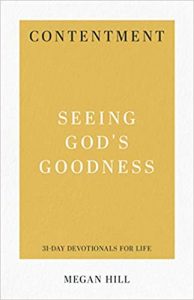
Contentment Is Really Possible!
But if discontent waits just around the next corner, grace does too. At every moment, in every one of life’s circumstances, the Lord is ready with forgiveness (Neh. 9:7), encouragement (Rom. 15:5), strength (Phil. 4:13), and love (Rom. 8:38-39). The God who made you and sustains you is able to make grace abound to you for all things at all times (2 Cor. 9:8). In the fight against discontent, you are never alone.
I wrote Contentment: Seeing God’s Goodness because the temptation to discontent is common to all of us (1 Cor. 10:13). By the help of the Holy Spirit, we all—including me—need to rest content in God’s sovereignty over the circumstances of our lives. And it’s only when we look away from ourselves and our own circumstances that we can lay our eyes—and our hearts—on what truly satisfies: God and his good purposes.
This book was born in the midst of my own temptations to grumbling and anxiety. I wrote and edited while experiencing parenting challenges, relational disappointments, a leaking roof, an unexpected job change, and the daily repetition of dishes and laundry and dirty floors.
The Secret of Contentment
Not a day goes by that I don’t have to remind myself of the truth I wrote:
“The secret of contentment is not in having ‘enough’ money (or status or relationships or education). Rather, the secret of contentment is placing our ultimate hope in something secure:
The Lord will never leave us or forsake us; he is our help, so there is no reason to fear.”
Contentment: Seeing God’s Goodness can be purchased from Amazon.
 Megan Hill is a PCA pastor’s wife living in Massachusetts and an editor for The Gospel Coalition. She is the author of Contentment: Seeing God’s Goodness (P&R, 2018) and Praying Together (Crossway, 2016). This article is adapted from Contentment.
Megan Hill is a PCA pastor’s wife living in Massachusetts and an editor for The Gospel Coalition. She is the author of Contentment: Seeing God’s Goodness (P&R, 2018) and Praying Together (Crossway, 2016). This article is adapted from Contentment.
Counseling Hope to Your Heart,

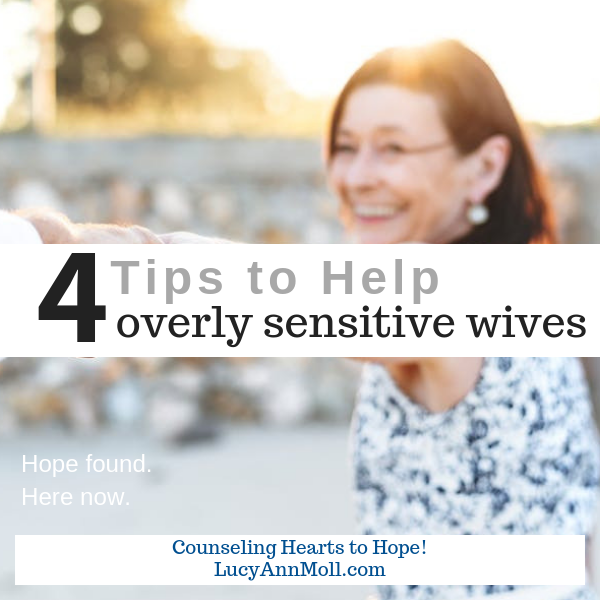
by Lucy | Oct 9, 2018 | biblical counseling, emotions, relationships |
HELP & HOPE for overly sensitive wives! Has your husband claimed you’re overly sensitive? Maybe you are overly sensitive. Maybe you aren’t.
Scroll to the 4 tips below.
This article by biblical counselor Andrea Lee appeared first here at The Biblical Counseling Coalition website and used with permission.

Touchy. Moody. Easily offended. Has your husband ever said this about you?
Click & Tweet!
Does he walk on eggshells around you or fear you will misinterpret his comments? Are you overly sensitive to his assessment of your performance or character?
To define my terms, an “overly sensitive wife” is excessively hurt by the delivery and content of her husband’s comments.
Her emotional frailty makes playfulness in the marriage rare. Furthermore, she overreacts to any reproof, making it hard for her husband to help her grow. Instead of overlooking a poorly timed comment or opinion with love, she is devastated. She is allergic to criticism and assumes her husband is trying to hurt her.
Let me be clear.
There are times when you as a wife must address issues of biblical obedience or conscience with your husband.
You should confront your husband if he maliciously uses humor, constantly criticizes, or is regularly harsh and irritable. Such provocation is ungodly and if this is a pattern, discuss this with him, and if needed, seek help from your pastor or a biblical counselor.
But often believing husbands are not being malicious. Nonetheless, you might find yourself provoked, offended, and hurt. Even though your husband could grow in his ability to gently reprove you, you know you’re part of the problem.
Such emotionally disproportionate responses never lead to peace. As you examine the ways you contribute to low-grade conflict in your marriage, pay attention to the following four areas.
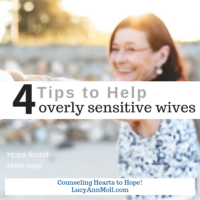
1. Realize the connection between desires and interpretations
Our values and desires shape how we interpret our experiences. In other words, the things we desire, cherish, and love more than God influence the way we make sense of conversations and circumstances.
For example, because a wife wants to be perfect in an area (mothering, housekeeping, decorating, fashion, cooking, poise, entertaining, etc.), she might overreact when her husband mentions a weakness. The problem isn’t that her husband is wrong or spiteful, but rather she has assigned too much value to this area.
2. Recognize the link between idolatry and pride
When our desires are frustrated, we can respond with unreasonable hurt and irritation. This is idolatry. Idolatry is looking to, clinging to, and trusting in something other than God in order to achieve a desired experience or outcome (Is. 44:17; Hab. 2:18; Col. 3:5).
We either want what God says is wrong, or we want a good thing too much. Foundationally, idolatry serves self. We use things or people to exalt us or to give us pleasure, comfort, control, and approval.
Overly sensitive wives seek fulfillment in their achievement or performance. We are willing to pout, cry, or withdraw when our husbands minimize our efforts. This happens because we’ve merged performance with identity: “If I don’t perform perfectly, then I’m not worth anything.” This may sound like humility, but it’s really pride.
What are some signs that pride may be at work in your life? Stuart Scott pinpoints several markers of pride that fuel oversensitivity. These markers include being …
- devastated or angered by criticism
- focused on self and wanting self to be elevated
- consumed with what others think
- defensive
- convinced that you have little sin and others are more sinful
- disheartened because you are not perfect and have weaknesses.
3. Repent of specific manifestations of idolatrous pride
So what are some desires that create conflict in this area?
Perfectionism
An overly sensitive wife focuses on areas where she wants to be the best. She wants her performance to merit approval from others. And when it doesn’t, she is devastated and reacts with quiet hurt or loud defensiveness.
Fear of Man
Perfectionism and fear of man go hand-in-hand.
The hypersensitive wife wants to be perfect so that others will praise her and have no ground for judging her. When she focuses on her husband’s evaluations and stops worshiping God, her performance takes center stage.
It devastates her when she fails to meet her own standards. Instead of repenting of pride and the way she exalts herself, she lashes out at the one who draws attention to her “failure.”
Control
We all use control as a strategy to get what we want.
And the overly sensitive wife believes she knows best and if everyone would do things her way, life would work at optimal speed and enjoyment. She is quick to defend her motives and ignore her sin. She wants to be seen as blameless in all ways and is unaware that her motives are mixed. And she underestimates how sinful she is and is easily hurt when her husband questions her motives.
Use these descriptions to evaluate the way pride impacts your interactions with your husband. This will help you repent more thoroughly and change more deeply.
4. Respond with worship and love
Our God of all grace (1 Pet. 5:10) can help you to lay aside destructive sensitivity and to put on humble love for Christ and others. Turn to him.
- Ask God for grace and wisdom to repent of wanting your husband to regard you as perfect and worthy of constant praise.
- Pray God will help you to cherish Christ’s perfection and put away attempts to establish your own righteousness.
- Thank God He empowers your love and service (1 Pet. 4:11) and causes you to grow (1 Pet. 5:10; 1 Thess. 5:23-24).
- Choose to believe the best about your husband. Assume he has good motives unless he confesses otherwise (1 Cor. 13:4-8; cf. 1 Cor. 4:5)
- Focus on loving your husband and praying for him rather than on being loved perfectly by him (Phil. 2:3). Only Christ will love you perfectly.
What fuels your over-sensitivity?
1 Stuart Scott, From Pride to Humility (Bemidji, MN: Focus Publishing, 2002), 6-10. 2 For more on the ways sin is natural, see Ed Welch, Crossroads: A Step-by-Step Guide away from Addiction, Facilitator’s Guide (Greensboro: New Growth Press, 2008), 31.
Want Help?
It’s miserable to be overly sensitive, right? You’re often anxious, afraid, and just plain sad. May I suggest that you consider getting help from a trusted Christian friend, a pastor, or a biblical counselor?
A great resource is Heart2Heart Counselor Directory! See it here. Look over the personal profile pages of experienced and vetted female biblical counselors, listed by location and speciality. Nearly all Heart2Heart counselors also counsel by Skype/Facetime too.
Counseling Hearts to Hope,

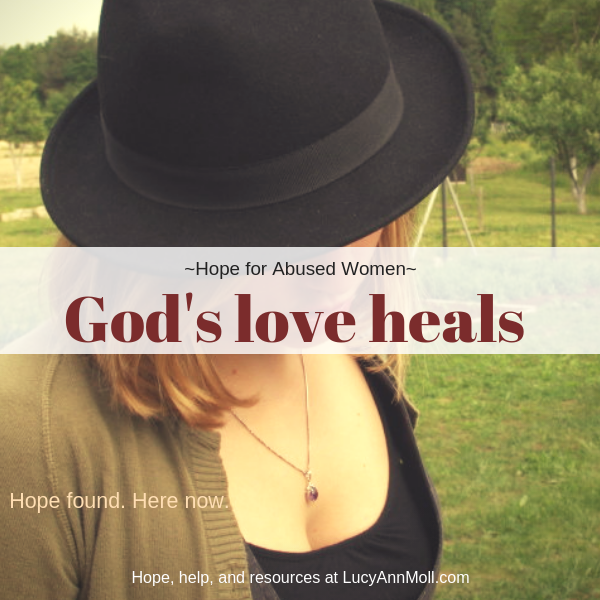
by Lucy | Oct 2, 2018 | biblical counseling, emotions, relationships
Truly embracing God’s love for you — especially if you’ve experienced the horror of sexual abuse — is the way to hope and healing. Do you want healing too? Read Monica’s story and learn how gospel-centered counseling helped remove stumbling blocks to her faith. Consider biblical counseling for you or a loved one too.
This article by biblical counselor Shannon Kay McCoy, featured on Heart2Heart Counselor Directory here, appeared first at the Biblical Counseling Coalition website and is used with permisison.

Monica’s Story
At a young age, Monica was sexually abused by her step-father until he divorced her mother. In her teenage years she was raped by her brother’s friends.
She lived a life of promiscuity—getting pregnant twice with both ending in abortions. She was drinking alcohol heavily and using drugs until the age of 24 when she developed cervical cancer. God used her illness to get her attention.
Click & Tweet!
She became a Christian and met her husband, Jeff, at church. Only one year into the marriage, Monica began suffering from bouts of depression and self-loathing.
She was distancing herself from her husband but didn’t know why. You see, she thought as a Christian, she shouldn’t struggle with these issues. Finally she confided in a Christian friend who encouraged her to seek biblical counseling.
The Journey Begins
The counseling process helped Monica to discover some stumbling blocks to her faith. She had doubts about God—about His goodness, His grace, His love, and doubted ever being free from condemning thoughts. With the love and support of her husband, she began the difficult process of looking at her past through the lens of Scripture.
She was afraid to r eveal certain details to Jeff because she didn’t want him to stop loving her. He assured her of his love and commitment, so she forged ahead allowing God to peel away layer after layer into her past.
eveal certain details to Jeff because she didn’t want him to stop loving her. He assured her of his love and commitment, so she forged ahead allowing God to peel away layer after layer into her past.
During the most difficult layers of dealing with the sexual abuse, she had to distance herself from him intimately. After eighteen months of biblical processing, Monica was able to restore her relationship to her husband.
Believing Again in God’s Love
Through the counseling process, her faith had grown stronger. She believed in God’s goodness and grace. But she wasn’t so sure about His love.
She told the counselor that she still couldn’t understand how a holy God could love someone with her past. The counselor asked her,
How do you know that Jeff loves you, even after knowing of your past?
She thought about how Jeff had been very supportive throughout the counseling process. He had been incredibly gracious to her when she was at her worst with depression and self-loathing. During the time she separated herself from him intimately, he was amazingly patient and forgiving.
He wasn’t shocked nor disgusted when he learned of the sexual abuse. Instead, he was a safe and secure haven.
Her husband’s love encouraged her to share her heart with him. Knowing her ugly past, she was only met with Jeff’s unconditional love. In return, she loved him in a much deeper way. She would sacrifice her time and energy to please him.
And spending time with him was no longer a burden. She treasured every moment with him because she felt valued by his love.
Reclaiming Her Love for Her Husband
Monica kept growing in her relationship with God and her husband. Indeed, she no longer feared her husband’s love.
Click & Tweet!
To the question, “How do you know that Jeff loves you?” she answered this way. “I know Jeff loves me because he has demonstrated his love in marvelous ways.” The counselor asked Monica to read Romans 5:8, which states,
But God shows his love for us in that while we were still sinners, Christ died for us.
The counselor stated that God proved His love for her by sending His Son, Jesus, to die for her sins. And since she is a believer, there is no condemnation for those who are in Christ Jesus (Romans 8:1).
The counselor also reminded Monica that God’s love was lavished on her through Jeff’s love. Seeing how Jeff loved her with the love of God, she began to get the picture. She finally grasped a greater understanding of God’s love.
Monica also learned that God’s love for her is incredibly gracious and sacrificial, amazingly patient and forgiving, safe and secure, and completely accepting of her in spite of her past. She realized that Christ has given her a new identity—His identity. She was no longer a victim living in her past.
Click & Tweet!
God saw everything she did and yet still loved her. This realization gripped Monica deep into the core of her soul.
Motivated by Love to Love
God’s love granted Monica the grace to love Him. As she daily contemplated His love, she became more sensitive to affronting the One she loved which led quickly to repentance of sin. She also found it easier to pray. And she didn’t fear seeking His presence.
In addition, she wanted to spend time with God. She desired to please Him with her time and energy. She had a growing willingness to sacrifice her life for God’s glory—no longer doing things her way.
Monica learned as the Apostle Paul did, that “the love of Christ controls us” (2 Corinthians 5:14). Christ’s sacrificial, substitutionary death motivated Paul’s service for Him. In Galatians 2:20, Paul states,
I have been crucified with Christ. It is no longer I who live, but Christ who lives in me. And the life I now live in the flesh I live by faith in the Son of God, who loved me and gave himself for me.
Paul learned that he died to the Law because he was crucified with Christ. Therefore he was able to live for God because Christ lived in him.
The greatest love of all.
True love has a constraining virtue. Monica realized this in Jeff’s love for her. It cost him something to love her. He accepted the consequences of her past and chose to love her. She would do anything for him because he loved her at her worst.
Even greater is the love of Christ. It cost Him something to love us. He gave up His life when we were at our worst—and still loves us at our worst. By faith Monica embraced God’s love for her. In return, she loved God because He first loved her (1 John 4:19).
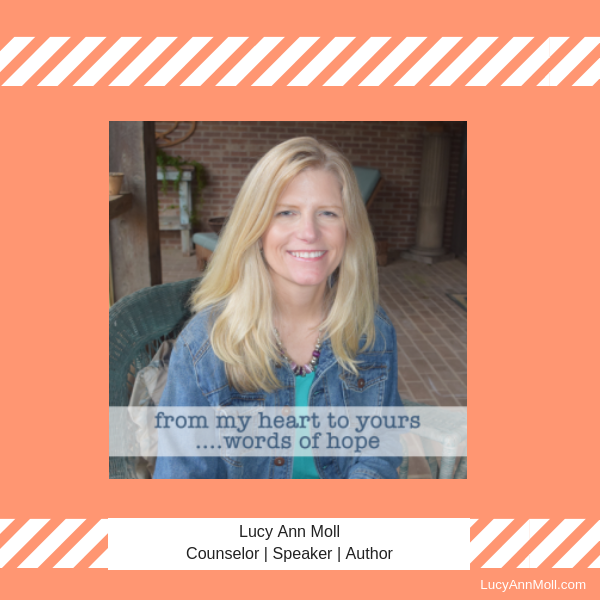
Join the Conversation
Think of a time when you felt really loved by someone. What effect did it have on you? How did you respond to that love? Now think of God’s love for you. What effect does His love have on you? How do you respond to His love?
Counseling Hearts to Hope,

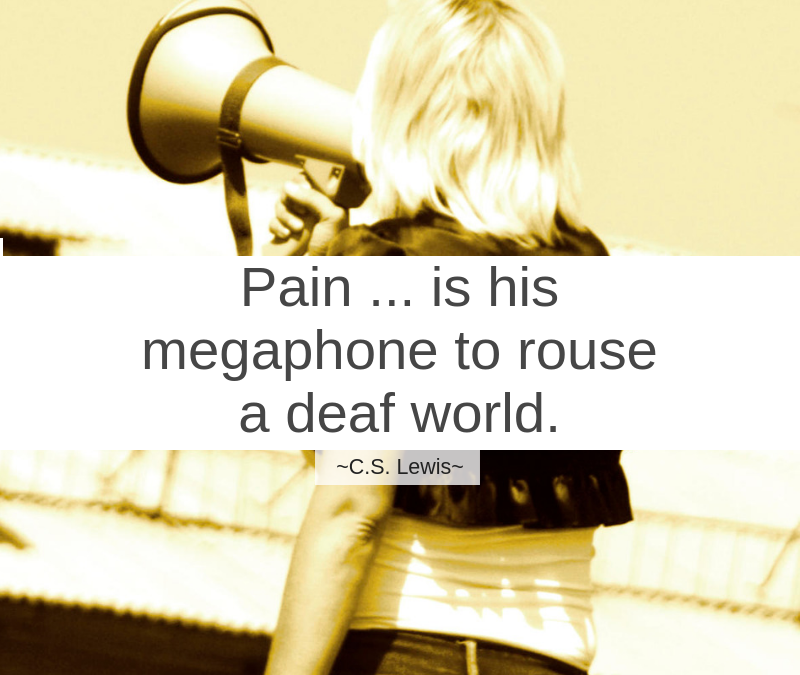
by Lucy | Sep 6, 2018 | emotions, whole health wellness |
My mistake began as many bad things do. . .with no warning.
Click & Tweet!
I had skipped my gym workout. So to appease my guilt, I decided to stretch gently for a few minutes then do 25 full sit-ups. Bad mistake. You see, very soon I’d injure myself. And soon after my physical injury, emotional pain would hit me upside the head.
And as my pain worsened — physical and emotional — I learned 3 lessons I’ll share in just a moment.
Have you made a mistake too? What pain did you experice?
My Sit-Up Mistake
Now back to my sit-up story.
On that day which I’d love to erase from the calender, I tucked my feet under the couch, laid on my back, and rolled all the way up. (Seriously, friends, do NOT perform sit-ups this way. Too late I learned this truth from Bob and Brad, popular YouTube physical therapists. Check out this video of 15 exercises to never do.)
On my eighth full sit-up, something in my back felt weird. But I pressed on and completed two more sit-ups, far short of my goal. I rubbed my back and called it a day — and didn’t think much of my situps
until the next morning
when I awoke to an intense clenching in the muscles in my lower back and numbness in my legs. I elbowed my snoozing husband.

“Steve, something’s wrong. I need your help. Steve, wake up.”
I worried. (Yes, I know worrying is a sin.) Yes, pain had gotten my attention.
More Problems Hit
As I rested and got pampered by my family who cooked, laundered, and swept, as my cats curled next to me, I found out that a close family member needed daily injections. Nothing life threatening, but just another thing to handle. Time passed. My back injury lingered. And my emotional pain intensified. Dare I admit, I asked “Why me?”
I remember thinking and praying,
“God, the doctor said I should be better in four to eight weeks. I’m not. Walking and standing hurts, and my legs and feet feel bubble-wrapped, and now a family member is hurting. Help us.”
Then, health difficulties slammed two more family members and I prayed again.
And again.
More intensely.
Louder.
Desperately.
You may have heard this quote by C.S. Lewis:
God whispers to us in our pleasures. He speaks to us in our conscience, but He shouts to us in our pain. It is His megaphone to rouse a deaf world.
God was rousing me.
3 Take-Ways After a Mistake
You and I each have dealt with mistakes of all sorts–physical, emotional, relational, and spiritual. Until we see Jesus face to face, more pain will come. Sometimes a drizzle, sometimes a thunder and lightning and darkness.
As I’ve pondered these things and sought God’s counsel, I learned three things from my mistake.
1. God wants to meet with us. In other words, He wants us to talk with him and listen to him, prayerfully. Psalm 10 is great example.
2. God blesses you and me. Ephesians 1:3 underlines the truth that we who love Jesus have been blessed with every spiritual blessing in the heavenly realms. Every means every. You do not need to get more blessing. You have it all. Now.
3. Whatever happens as a result of a mistake, God knows what He is doing, for his glory and our good.
Click & Tweet!
It’s unimportant we understand it all. God does. He is in control. I am not.
What’s the bottom line? I believe God is good and sovereign and all-wise. He remains true when I falter. And so I hope in him. Even when I’ve made a mistake. Even when pain comes.
Question: What have you learned when you’ve made a mistake? If you have a moment, please leave a comment.
Counseling Hearts to Hope!


by Lucy | Aug 23, 2018 | biblical counseling, emotions |
God met me at the library. How strange! How crazy and wonderful and amazing!
Twenty-three years old, newly married and out of work, I scanned the shelves for redecorating books. I wanted something, anything, to turn my two-bedroom apartment into a home. Someplace cozy for my husband, Laces (our shy beige kitty) and me. God had another idea. A better idea.
Cradling several books, I felt drawn to the 200s yet jittery like a kid on Red Bull.
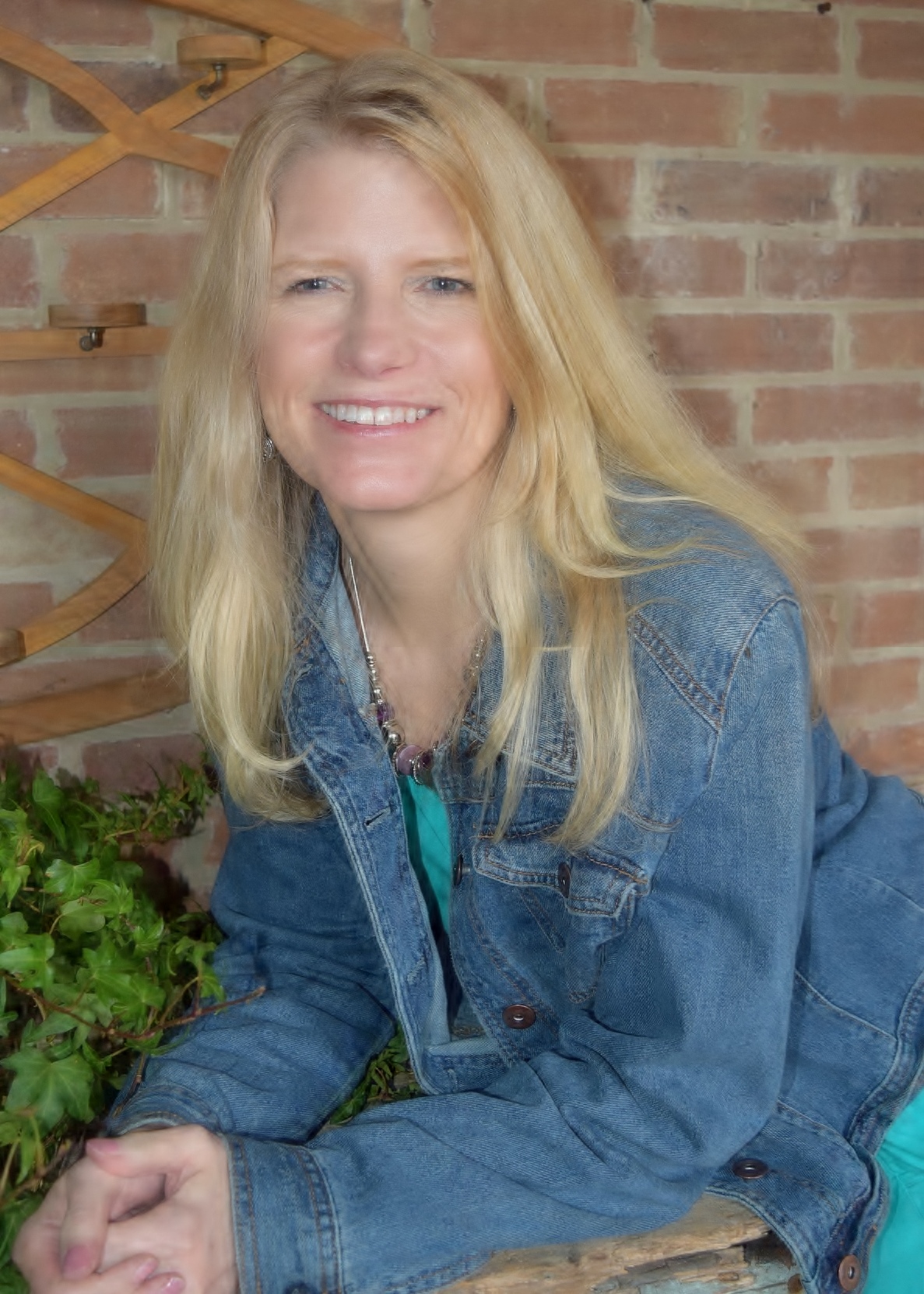
Lucy Ann Moll
Why Am I Here?
Why am I here in the religion aisle? This is strange. Has God brought you to a strange place too to get your attention?
Flanked by books, I slid out Basic Christianity by John Stott. Simple, direct, basic like the title said. So basic I felt stupid. I looked left, right. No one near me. Good. I stuck it back and grabbed a fat book. An important book. That’s better. . .and boring.
Back to Basic Christianity and my spirit quickened. A new problem: What would the check-out clerk think? Seriously, BASIC Christianity. She’ll think I’m stupid. Have you worried about what others think too?
A Holy, Terrifying Moment!
Today, as I look back, I know this moment was holy. God faced the evil one on my behalf. Would I side with God? Or my foolish pride? The serpent appealed to Eve’s ambition to be like God. Would I bow down to pride, fear, self-importance?
You know who won: God. He guided me from the checkout to my apartment, where I devoured the simple book and trusted Jesus to make his home in me. I sensed God’s Spirit in me. A peace and joy I cannot describe replaced my restlessness. When my husband came home, I hugged him big and said, “Guess what I did today, honey?”
Later, I asked to borrow his Bible, a soft cover New Testament that I read over and over and over. God knew I loved books. So he gave me his very best.
Now the Rest of the Story
We each have precious stories of how God wooed us. How did he woo you? Do you remember where you were and what you were doing? Were you in crazy place looking for calm?
As a child I knew emotional pain. Did you have a difficult childhood too?
I leaned toward girls like me. Quiet, shy, invisible girls. Girls with hurts. With secrets. In my early 30s, I tripped into a black hole of depression. God “mothered” me back to life, then whispered a call to my heart, confirmed by scripture. He said, “Bind up the injured” and “strengthen the weak” (Ezekiel 34:16) and led me to study pastoral care to women at Western Seminary, Portland. Later I trained to become a certified biblical counselor through the ABC and then from ACBC.
At last, I knew why God met me at the library. He planned and purposed me to serve him in the role of biblical counselor. As God gave me hope, I counsel hearts to hope. And recenty I’ve been working on my doctorate at Birmingham Theological Seminary. This has opened doors too.
An Offer
Would you like to talk in person or by Skype/Facetime/Hangouts about a solution for your struggle? I’ve counseled people by webcam from California to Cambodia, New York to New Zealand, Houston to Hong Kong, Pennsylvania to Paraguay.You get the idea. I also have offices in greater Chicago where I meet women, couples, and children in person.
Send me a message and we can set up a time to talk by phone, and you can see if biblical counseling is a good fit for you. The best thing about biblical counseling is it’s gospel-centered as well as compassionate. It’s also effective, affordable, and usually very short-term. God loves you so much and wants the best for you.
Counseling Hearts to Hope,

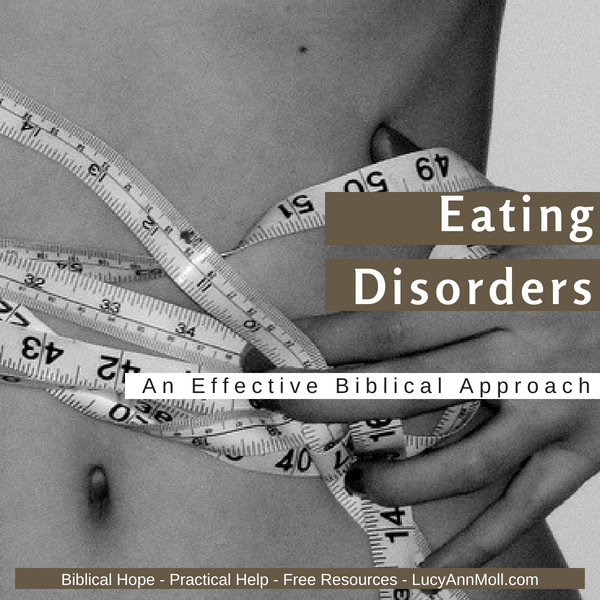
by Lucy | Aug 7, 2018 | biblical counseling, emotions, whole health wellness |
Eating disorders — this problem has a comprehensive Christ-centered solution. It involves biblical counseling and often medical professionals for lasting change. Guest blogger Hayley Satrom, a biblical counselor with HeartSong Counseling in Washington, D.C., shares her article that originally appeared on the Biblical Counseling Coalition website and is used with permission.

As a biblical counselor, I meet with many people whose lives, hearts, and minds are controlled by an obsession with food. Whether anorexia, bulimia, or binge-eating, disordered eating patterns are very common among my counselees. I’ve also found that often they need professional assistance beyond what I alone can provide.
Now, hear me out. I believe there are many counseling issues we biblical counselors can face without additional help from other trained medical professionals. That said, eating disorders, in my opinion, are simply not of that category.
After working with many anorexic and bulimic individuals, I have come to respect, and indeed mandate, a team approach to their care.
A Three-Pronged Approach
It was actually my supervisor, Deepak Reju, who was the first to suggest I utilize what he called a “three-pronged approach” in caring for counselees with eating disorders. “What are these three prongs?” you ask.They are:
- Biblical counselor
- Medical physician
- Nutritionist.
I now live by these three prongs when I counsel folks with eating disorders. Also the additional support has served me well as a counselor, and more importantly, has served my counselees.
Why the Extra Help?
On our best days, I like to think of biblical counselors as “specialists” when it comes to unearthing and tackling heart issues. And we do this by God’s grace—through His Spirit, by His Word, and in His church.
So please hear me that I am well aware that eating disorders are fraught with many heart issues. These heart issues include control, escape, body image distortion, anxiety, depression, distrust of God, confusion about God’s character, fear of man, and the list could go on and on. This list only begins to describe the important themes that a biblical counselor can and should unpack with someone who struggles with an eating disorder.
Is this enough, though? When a woman is abusing her physical body through either deprivation or bingeing of food, is processing heart issues the only help she needs? I can tell you that, from my experience, the answer is “No.”
In fact here are just a few of the ways a physician and nutritionist have come to my aid in counseling folks with eating disorders in the past:
Physician:
- Can tend to the innumerable health problems that are consequential to eating disorders (gastrointestinal disorders, heart problems, low blood sugar, fainting spells, etc.);
- Tests the body for important nutrients that may be low for someone abusing food (e.g. potassium, iron) and can prescribe supplements when needed;
- Will track the patient’s weight over time and can flag if the need for more intensive inpatient care is required;
- Can prescribe psychiatric medication if needed (or a psychiatrist could be used for this as well).
Nutritionist/Dietician:
- Manages everything food-related for the counselee;
- Creates meal plans for breakfast/lunch/dinner/snacks for a typical day and week;
- Provides specific accountability for food-related plans and goals;
- Conducts weekly weigh-ins (often blind to the patient) for the counselor and physician to refer to in monitoring the counselee’s progress.
As you can see, physicians and nutritionists can be of great help to the biblical counselor in caring for someone with an eating disorder. In fact, their support regarding the patient’s health and food needs allows a biblical counselor more freedom to spend the time in counseling appointments on what we do best—tending to the heart issues underneath the symptoms.
How Does It Work?
In practice, I try to meet weekly with counselees who are actively struggling with an eating disorder. I also suggest weekly meetings with their nutritionist for the sake of ongoing help in food-planning and accountability, as well as regular weigh-ins. Weigh-ins are particularly important for anorexic counselees. Their health and even very life are at risk if their weight drops too low.
Physician appointments do not need to be so frequent, unless specified by the doctor. In general, I find it best to allow the physician to lead the conversation on how frequent the patient needs to see him or her. Frequency of visits will depend upon the specific health challenges that exist due to the eating disorder, which is different for every counselee, of course.
I think it is helpful to check in with the physician and nutritionist every month or so to share notes on the counselee and to discuss next steps in coordinating her care.
Linking Hands
As biblical counselors, we provide an invaluable service of helping others change by addressing the heart issues that underlie thoughts and behaviors. We try to lead people to Christ—to know Him, trust Him, and lean into Him for help with even the hardest struggles. This service is necessary and irreplaceable. That said, in some situations we can do more. In fact, in some situations we NEED to do more.
An eating disorder is one of those situations. Eating disorders can be dangerous with many physical health consequences. Let’s link hands with other experienced caregivers who can advise our counselees on certain matters better than even we can. By caring for our counselees’ souls, minds,and bodies surely we will bring much glory to God.
Join the Conversation
- What are your convictions regarding biblical counselors engaging with other care-giving professionals?
- What else have you found to be helpful and effective as you care for individuals with eating disorders?
- Maybe you have even struggled with an eating disorder yourself. What advice would you give to caregivers?
Counseling Hearts to Hope,


![]()

![]() Megan Hill is a PCA pastor’s wife living in Massachusetts and an editor for The Gospel Coalition. She is the author of Contentment: Seeing God’s Goodness (P&R, 2018) and Praying Together (Crossway, 2016). This article is adapted from Contentment.
Megan Hill is a PCA pastor’s wife living in Massachusetts and an editor for The Gospel Coalition. She is the author of Contentment: Seeing God’s Goodness (P&R, 2018) and Praying Together (Crossway, 2016). This article is adapted from Contentment.












